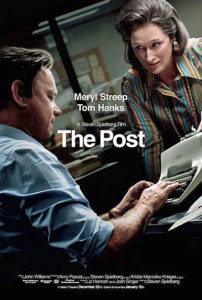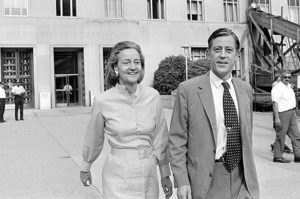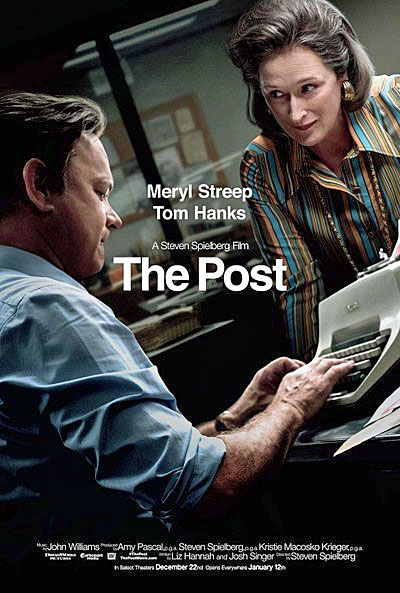
Watching director Steven Spielberg’s The Post triggered my memory to 47 years ago. At that 1971 time, I had been drafted for the Vietnam War, and was half-way through serving in the Army. Back then I was unaware of The Pentagon Papers, Daniel Ellsberg, and the nefarious war related doings of President Richard Nixon. (But make no mistake, I was against the war.)
Now to refocus on The Post, a fascinating historical-political drama about journalism’s impact on Richard Nixon and the Vietnam War—more specifically, ending the Vietnam War. Liz Hannah and Josh Singer’s compelling script zeroes on the owner/publisher of The Washington Post newspaper, Katharine “Kay” Graham (Meryl Streep) and her managing editor, Ben Bradlee (Tom Hanks). When The New York Times first publishes the dynamite story of the criminal reasons behind the United States involvement in the Vietnam War, Bradlee urges his boss, Graham, to have their Post join in the cause.
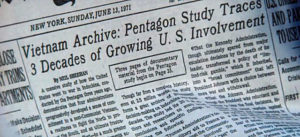 Widowed for several years, Graham had no experience in managing a newspaper by 1971. Her late husband, Philip, had tightly helmed The Post for years, leaving her as basically a wifely hostess at cocktail parties. At his passing, she was besieged by company board members and attorneys to relegate her newly inherited power to them. And Graham did so for several years, until Bradlee presses her to publish excerpts from 4,000-plus pages of stolen Defense Department documents aka United States—Vietnam Relations, 1945-67: A Study Prepared by the Department of Defense. Her lawyers warn her of lawsuits by the federal government and the resulting demise of The Post. It is no secret that eventually Graham chose to go to press—at great risk. The Post published the documents in a series of articles.
Widowed for several years, Graham had no experience in managing a newspaper by 1971. Her late husband, Philip, had tightly helmed The Post for years, leaving her as basically a wifely hostess at cocktail parties. At his passing, she was besieged by company board members and attorneys to relegate her newly inherited power to them. And Graham did so for several years, until Bradlee presses her to publish excerpts from 4,000-plus pages of stolen Defense Department documents aka United States—Vietnam Relations, 1945-67: A Study Prepared by the Department of Defense. Her lawyers warn her of lawsuits by the federal government and the resulting demise of The Post. It is no secret that eventually Graham chose to go to press—at great risk. The Post published the documents in a series of articles. 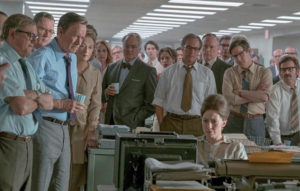 The ensuing drama is reminiscent of the 1976 movie, All the President’s Men, and there is an overlap here since Bob Woodward and Carl Bernstein worked at The Washington Post. (They are not depicted in this film, however.) We hear actual recordings of Nixon talking about The Post as he is supposedly shown in silhouette at his Oval Office window.
The ensuing drama is reminiscent of the 1976 movie, All the President’s Men, and there is an overlap here since Bob Woodward and Carl Bernstein worked at The Washington Post. (They are not depicted in this film, however.) We hear actual recordings of Nixon talking about The Post as he is supposedly shown in silhouette at his Oval Office window. ==========
A production pic of Director Steven Spielberg conferring with his lead stars, Meryl Streep and Tom Hanks.
==========
In viewing The Post, expect cerebral thrills instead of any physical stunts. The action occurs mostly in the newsroom, the corporate boardroom, private meetings between Bradlee and Graham, and in the gathering of information by reporters. Deadlines themselves can be exciting, especially when dodging the feds in meeting such. Again, this is more so the All the President’s Men school of storytelling.
But the cinematic takeaway here is a combination of the factual story, the superb supporting cast (Sarah Paulsen, Bob Odenkirk, Carrie Coon, and Tracy Letts among them), and the film’s powerhouse leads, Streep and Hanks. Streep, particularly, gives a nuanced performance that becomes less subtle by the third act.
==========
The real life duo who tested The First Amendment by publishing The Pentagon Papers: Katharine Graham and Ben Bradlee…around 1971.
==========
Her Kay Graham is a lady used to being subservient in a male dominated world. Graham helped change that reality, making The Post a film more than just a recounting of The First Amendment applied to a scandalously unpopular war. Its timeliness serves as a link to today’s Me Too and Time’s Up movements.
——————————
GRADE on an A-F Scale: A-

